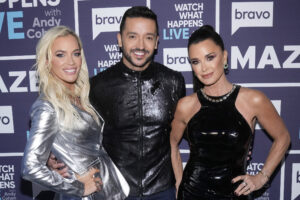You had played bad guys before Deacon, right? “I did. I played Mike Barnes in Karate Kid III. ‘Your karate is a joke!’ I did THE OUTSIDERS TV series for Francis Ford Coppola and I played another bad guy, the head of the Socs, which was the rival gang. He wasn’t necessarily a bad guy, but he was a heel. I played another one in a film called Rich Girl. I’ve played a lot of baddies.”
In 1993, your first daytime role was GH’s duplicitous A.J. What was it like to play the Quartermaine black sheep? “Even though A.J. did some reprehensible things over the years, I never played A.J. like a bad guy. I never saw him as a bad guy, I saw him as a tragic guy who wanted to do the right thing, but he was locked into this role that everybody trapped him in, his family and everybody else.”
Then came Deacon in 2000. Did you know from the start that he was more of a villain? “I remember Brad [Bell, executive producer/head writer] described him as the devil. That was actually the word used to describe Deacon. He was definitely a bad guy.”
What was your process of getting into the character? “When I started, one thing that really helped me was the external appearance of Deacon, like growing the sideburns and the goatee. I tried to establish a more malevolent, intimidating look. The earrings and the clothes really helped. Deacon didn’t look like anyone else on the show, and that, right away, helped me slip into the role.”
What do you consider to be the most dastardly deed your character has done? “Oh, I think we all know that one. I put it before stealing Little Eric, sleeping with Massimo’s wife [Jackie] while he was incapacitated and taunting him about it, and everything he did to Nikki [on Y&R]: It was definitely the phone call he made to Bridget’s family [as he deflowered her]. That was just nuts! Who knew Brad had that delicious darkness lurking within him? That was messed up. I was so uncomfortable watching that episode from the Forresters’ point of view. I was cringing. What an evil, horrendous bastard Deacon was back then.”
Do you think Deacon harbors any guilt about his bad actions? “Most definitely. He still feels terrible about taking advantage of, and hurting, Bridget. He did back then, too. Who knows how things might have turned out if he had taken another tack?”
What have you enjoyed most about playing a baddie? “It was a lot of fun to know that Deacon disrupted the lives of everybody he met. He triggered them, and in society, we don’t try to trigger people. But, if you were predisposed to having that kind of personality, you might take a lot of pleasure if you were good at it. Deacon was very good at triggering people because he was getting a reaction. He was almost like a child seeking negative attention, and he was relieved because he was getting attention. He was also very seductive, a trait which Deacon used for manipulation instead of establishing connection, and that was an interesting dichotomy to play.”
Have you ever had a hard time shaking off your character’s darkness when a scene ends? “I’ve said this before about playing A.J.: There were previously times in my life where I felt I was carrying some of that behavior off camera, thinking it gave me more fuel to do it on camera, which was completely untrue. I’m glad I’ve been able to reconcile that. You don’t have to mirror your character’s behavior. I like to believe it’s something I can turn off and on. I’m in a place now where I know how to do it without letting it affect my real life.”
How do you explain Deacon’s evolution into the man he is today, one who has actively tried to change his ways? “Love is one of the most powerful forces of change in the universe. Deacon, with all his heart, loves Hope, and if she can love him, then there is something about him that is lovable. That also means he’s not that bad guy he thought he was for a very long time. It’s fundamentally important for Deacon that his relationship with Hope flourishes and that she loves him for who he is.”
Who is your own favorite fictional villain? “Hannibal Lecter. Yes, he’s a homicidal, serial-killing cannibal. But, if you look at Hannibal Lecter’s macro objective in The Silence of the Lambs, it is not to be the best serial killer in the world. It’s to see if Clarice Starling has the qualities and tenacity and the goodness of character that merits him helping her. That relationship is fascinating. In people who are ostensibly very, very bad characters, as an actor, you have to find the humanity in them.”







